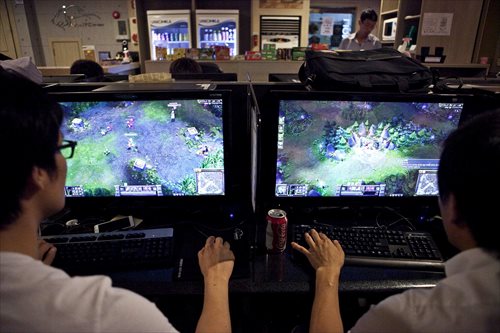Virtual winners
Internet bars in China are best known for their rows of zombie-like customers, with their glassy eyes, cigarettes hanging from mouths, encased in headphones, fingers locked to the keyboard and mouse as they murmur to themselves.
Very few people would think it's also home to a different breed of gamer - young men who actually make a living from playing video games, some of whom are officially known as cyber athletes.

Professional computer gamers train for hours every day. Photos: CFP

Professional computer gamers train for hours every day. Photos: CFP

Professional computer gamers train for hours every day. Photos: CFP
China's General Administration of Sport listed cyber gaming as the country's 99th formally-recognized sport back in 2003. "In Shanghai, there are more than 100 registered cyber athletes," Xu Ruzao, director of Shanghai DG Electronic Sports Club, told the Global Times.
There are another few hundred on top of that who, though they lack official accreditation, are still fully engaged in the sport. According to Tong Xin, an executive manager at Shanghai Newbee Electronic Sports Club, the city has around 20 cyber games clubs involving around 400 full-time gamers. "The average age of these players ranges from 18 to 22. And their incomes differ a lot - with professional clubs paying them anywhere between 2,000 yuan ($323) to 12,000 yuan a month (prize money not included)," Tong told the Global Times.
Generous rewards
These young men train hard and enter national and international competitions. Zhang Ning is one of them. The 25-year-old has led his team of five to claim several world championship titles in Dota 2, a multiplayer online battle arena video game.
Zhang, a Hunan native, has been a professional Dota 2 player for more than four years. His involvement in video games dates back to his primary school years. At the age of 15, he won 10,000 yuan in an online video game competition.
Zhang says it's purely the fun of the games that keeps him in the field. But as a professional player, he needs to take it seriously. He trains with his teammates for up to seven hours a day, six days a week to improve their tactics and work out ways to deal with different situations. "The training is not demanding at all. For the rest of the day, I am still in front of the computer, surfing the Internet, watching videos or playing games to kill time. You know, we cyber gamers don't stray outdoors a lot," Zhang told the Global Times.
His passion for video games was not looked upon kindly by his family to begin with, which led him to hide from them the fact that he was moving towards becoming a professional gamer. But when they saw his devotion and success, said Zhang, his family gradually came to accept his choice.
It's likely the decent income Zhang sees from gaming also helped win his family's support. The club that employs Zhang pays him a little over 10,000 yuan a month. But the bigger proportion of Zhang's income is from tournaments. "Last year, the prizes I won from different tournaments added up to somewhere between 300,000 yuan and 500,000 yuan."
Hard training
Su Youchao, who was a full-time cyber gamer for nearly 10 years before retiring at 28, admits the generous prize money is attractive. But he told the Global Times that what drove him to dedicate so much time to practicing was a dream. "My motivation was to become a top player," Su said. He concentrated on non-team games such as Warcraft III and StarCraft II: Wings of Liberty. He once represented China in the final of the World Cyber Games, and has also won a number of national titles.
"I was under great pressure and the training was tough," said Su, who usually trained from 10 pm until 10 am the next day, as that is when he can get better and more reliable Internet speeds.
Tong Xin, who was a professional gamer for nearly two years before retiring from the sport at the age of 25, said the tough training regime made him sick. "I used to train 12 hours a day. My days were purely about the training, apart from eating and sleeping. I occasionally took one day off."
He still has a respect for the games themselves. "The games provide an absolutely fair environment for people to compete in. Developers fix any design flaws once they are reported. I don't think absolute fairness exists in real life. So when we conquer others in a game, we gain a special sense of achievement," Tong said.
Core attraction
While professionals engaged in team games often serve until the age of 27, players of non-team games normally hang up their mouse pads at between 22 and 24. "That is because in team games like Dota, teamwork and understanding of the game is more important than operational skills. But non-team games impose tougher demands on an individual player's physical ability. Most professional players of games like Warcraft III see their APM (actions per minute) surpassing 300," said Tong Xin.
According to Tong, most retired gamers choose to stay in the industry by taking up administrative positions, becoming coaches in clubs, or working as commentators for cyber game competitions. A minority completely shift to another field due to pressure from their families, Tong said.
Xu Ruzao said the wider recognition of professional cyber gaming has improved a lot in the past few years. "I see people of my age, in their late 40s, who are quite open-minded towards this profession," said Xu, who supported his son when he expressed an interest in pursuing a career in the gaming industry. "My son is now a game software developer working in a South Korean company," Xu said proudly.
Newspaper headline: Professional computer gamers earn money and recognition